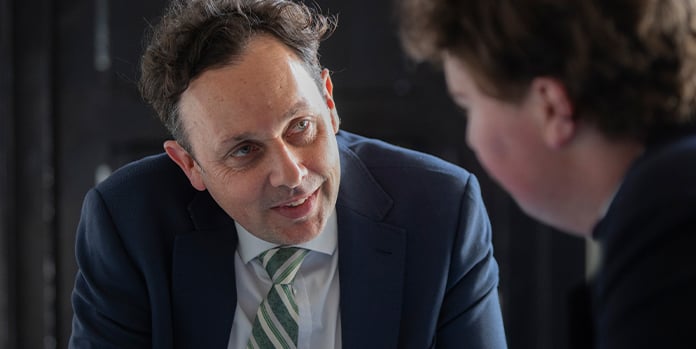Justin Glenn (OM 1993) describes his path to becoming the Head of Philosophy and Religious Studies at Melbourne Grammar School as anything but “straightforward”.
After choosing to study Arts and Law at the University of Melbourne, Justin left the course with the Law degree incomplete. “There was just some missing ingredient in Law for me,” he says.
Justin tried his hand at filmmaking but realised after several years that it “wasn’t quite right” for him either. It was his mother who pointed him in an entirely different direction. Her idea would change the course of his life.
“Mothers often see you in a way that you don’t always see yourself, and mine had always said teaching might be something I should explore,” Justin explains.
It was not an obvious suggestion, given that nobody in his family were teachers, and that Justin was self-admittedly nervous about the idea of standing in front of a roomful of people for a living. But he had faith in his mother’s judgement.
“I told myself I’m going to give that a go. I’m going to trust her. Trust that she knows me. To be honest, I wasn’t looking at it as a career at all. At the start I was thinking ‘This is just a thing in the world that might be worth exploring’.”
Reviving a love of philosophy
Justin began teaching English and Media Studies at Eumemmerring Senior Secondary College, and was eventually asked if he would consider teaching Philosophy as well. He agreed and discovered a passion for a discipline that he had enjoyed, but hadn’t pursued as a major, at university.
After then teaching philosophy at the Centre for Adult Education, Justin furthered his qualifications in the discipline, completing another Arts degree majoring in Philosophy and Religious Studies. It was during this time that he noticed a role that kept coming up in his job searches: Teacher of Philosophy and Religious Studies at Melbourne Grammar School. And a name came up with that as well: Felicity McCutcheon.
Felicity was the Head of Philosophy and Religious Studies at the School before Justin, and he credits her with an influence on his career as “remarkable” as his mother’s.
“I got the Melbourne Grammar job, and Felicity saw something in me that I don’t think I even fully acknowledged myself. That was a really wonderful thing.
“I think she saw a certain kind of character that she knew she could trust. She also saw something in my intellect and a certain talent that I think I knew of myself, but which I had never really shown off.”
Justin, who has been in the Head of Philosophy and Religious Studies role since 2018, is widely regarded as an exceptional teacher, and the success of his students is testament to his abilities. In each year since he began teaching VCE Philosophy Units 3 and 4 at the School, at least one student in his class has achieved the perfect study score of 50. Of the roughly one thousand students in Australia who studied the subject last year, three were awarded Premier’s VCE Awards. Two were in Justin’s class.
Justin thinks deeply about his profession and his students, and says that for him there is a complex balance between what he describes as “service” and “self-fulfilment” in his work.
“On one hand, it’s very much a life of service in some sense. I am beneath a certain authority. I will hear. I will listen to that. As a teacher, you’re also in service to your students,” he says. “And then there’s the other side, which is very much about things internal to me, things I feel really passionate about. Whilst there is a certain tension there, it seems to me that the craft of teaching has something to do with holding that tension in some sort of harmony.”
Encouraging iconoclasm
When asked what he hopes a student will remember of his teaching after they’ve left the School, Justin is typically thoughtful.
“[Head of English] Stephen Dessants once suggested to me that one of the distinctive features of the School is that it has a certain reverence for the iconoclast.”
For Justin, iconoclasm isn’t about attacking beliefs or institutions so much as building an understanding that the obvious or conventional path isn’t necessarily the right one. “I once heard a person describe the old Route 8 tram as a metaphor for the stereotypical academic and professional path of a certain kind of student. It took you from South Yarra to Carlton and back into the city – the school, the university and the office after you became a practitioner of law.
“It’s a very reductive notion, but it’s sort of true,” Justin explains. “That path may well be conventional, but that doesn’t mean there is not some good in it. It just wasn’t my path, and it took me some time to realise that. I came off because my guiding light took me in a different direction. I hope that’s what a student takes from my teaching and their time at Melbourne Grammar. I hope I can give them the courage and confidence to pursue their own guiding force.”



